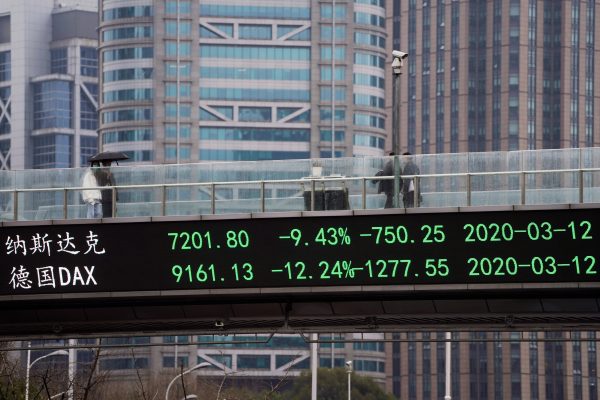Chinese authorities have an ambiguous relationship with global finance. Having a strong financial sector is crucial for China’s aspirations to becoming a global financial powerhouse and global players can help facilitate the professionalisation of China’s financial industry. A more internationally integrated capital market is very much in China’s national development interest.
This year, China’s financial system has undergone a series of reforms to further open Chinese markets and to facilitate foreign investment. Foreign ownership caps on joint ventures were lifted and quotas for Qualified Foreign Institutional Investors (QFII) and RMB QFII investor schemes have been scrapped. China’s Securities Law has also been reformed to simplify foreign participation, and China’s Bond Connect and Stock Connect schemes — the main vehicle to invest into China — have been widened to encompass other products and services, such as exchange trade funds (ETFs).
Despite the Trump administration’s attempts to sever US–China financial ties, China’s reforms have helped forge more engagement and closer connections between US-based financial institutions and Chinese markets.
The likes of Goldman Sachs and BlackRock were previously only allowed to own 49 per cent of their joint ventures, but since April this year they can take full ownership of Chinese securities, futures and fund management companies. Global investment banks and asset management firms are now paying fortunes for controlling stakes in their Chinese joint ventures after they had been relegated to junior partners for more than two decades.
China’s financial sector opening is partially due to the US–China ‘phase one’ trade deal — China’s closed-off financial markets had been a key point of contention in negotiations. Many observers viewed the opening of China’s markets as a major concession, portraying Wall Street as one of the few winners in the trade war. But this assessment might be misguided.
The organisation and development of capital markets in China is actively facilitated, controlled and directed by the state. What we see in China is ‘financialisation with Chinese characteristics’ where the Chinese Communist Party aims to maintain its control over socio-economic development in part by actively steering capital markets towards developmental goals. Chinese President Xi Jinping stated that the tasks of China’s financial sector were ‘[to] better serve the real economy, containing financial risks and deepening financial reforms’.
While other states have similar objectives, what sets China apart is the constant intervention into and active management of capital markets through its state-owned exchanges. This is not done through brute force or command-and-control mechanisms, but through ‘pivotal points’ in market infrastructure such as trading rules, market (data) access, position limits or margin requirements that are set by government-owned exchanges.
While Chinese capital markets share some characteristics with ‘global’ capital markets, they function fundamentally differently. China’s state-owned stock and derivative exchanges facilitate the development of what can be called state-capitalist capital markets — capital markets that follow an institutional logic derived from China’s state-capitalist economic system.
Markets are important in state capitalism but the state plays a significant role through intervention and ownership. Stock and derivative exchanges set the game in financial markets. Through their ownership the Chinese state can intervene in capital markets and steer dynamics. A fundamentally different way of thinking about, managing and governing capital markets has emerged in China and these capital markets. The last-minute cancellation of Ant Group’s initial public offering (IPO) — which would have been the world’s largest IPO — is a case in point. It was halted partially to protect Chinese retail investors and partially because founder Jack Ma openly criticised Chinese authorities. State control and policies, not private profit, shape Chinese markets. It represents an alternative to the norms, principles and procedures of the global financial order.
China’s recent financial opening closely follows this state-capitalist logic of organising markets. Chinese authorities are wary of losing control over market development with an increasing influx of foreign money. Rather than a ‘big bang’ style liberalisation, China’s opening-up process is organised in a way that enables its integration with global finance while maintaining distinctively Chinese characteristics in its capital markets. Chinese authorities can control markets and direct market outcomes towards national development goals.
Even if foreign investors can soon fully own brokerage and asset management firms, they will be subject to capital controls and must play according to the rules of the game set out by Chinese exchanges. A loosening of ownership rules for certain sectors of the financial system does not equal a retreat of the state as continued control over China’s capital markets is guaranteed through financial market infrastructure.
Foreign investors must use designated cross-border financial infrastructure such as Stock Connect or the QFII program to trade into China. These are infrastructure through which Chinese exchanges and regulators can monitor and steer their investment activities. It is clear that current ‘concessions’ do not represent a break with China’s pre-existing development path.
As long as China remains the world economy’s engine and global financial institutions can potentially make a fortune in the process, global players will continue to flock to China — and play according its rules. The Economist recently noted that ‘Wall Street’s taste for China reflects a long-term bet that finance’s centre of gravity will shift east’. Global finance is malleable and adapts to Chinese markets where it must, not vice versa.
Johannes Petry is a Postdoctoral Research Fellow at the SCRIPTS Centre of Excellence, Free University of Berlin.

